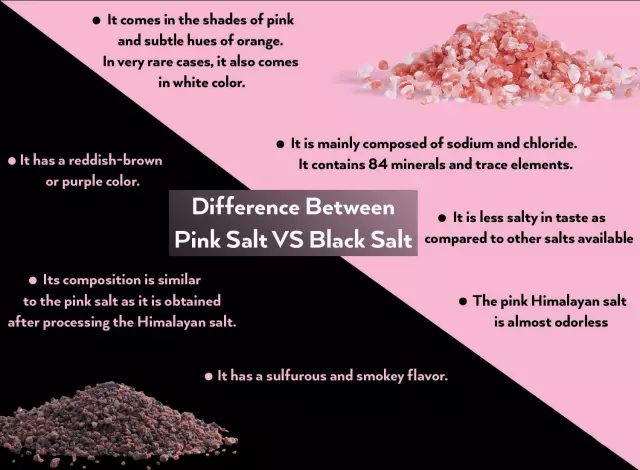- Author Rachel Wainwright wainwright@abchealthonline.com.
- Public 2023-12-15 07:39.
- Last modified 2025-11-02 20:14.
Black pepper
Black pepper is one of the most common spices, which is sure to be found in the house of every housewife.

Description
Black pepper is a shrub plant from the Pepper family. The plant is native to the Malabar Islands in India, so it is often called the "Malabar berry".
The fruits of the tree are green peas, which darken during processing. Depending on the harvest time and production technology, red, green and white peppers are also obtained. All varieties of pepper are used in cooking, but black pepper is the most popular.
In nature, the shrub climbs up, winding around the trees. Since the pepper began to be cultivated, special poles have been installed for it on the plantations, limiting the growth of the plant to 4-5 meters. In general, the bush can reach a height of 15 meters. The leaves are up to 10 centimeters long. After the end of flowering, the plant bears round fruits, which are initially green, and then turn yellow or red.
The length of the hand is up to 14 centimeters, which can contain 20-30 drupes. To get black pepper, the fruits are harvested unripe, and already during drying under the sun they turn black and shriveled. The ripe fruits of the plant are soaked in water, the soft pericarp is removed and white pepper is obtained, which is not as hot as black, but more aromatic and also popular in cooking.
In India, black pepper has been cultivated since ancient times; it was well known in Ancient Egypt, China, Rome and Greece. In the Middle Ages, pepper was highly prized and widely used in European cuisine, despite its high cost. In those days, merchants from Venice and Genoa had a monopoly on supplies. After that, the Portuguese, and even later, the Dutch, appropriated the right to supply pepper to Europe.
India, Brazil and Indonesia are the largest producers of pepper today. These countries grow over 40 thousand tons of pepper annually. In addition, black pepper is grown in Sumatra, Sri Lanka, Java, Kalimantan and other countries with tropical climates.
The use of black pepper in cooking
Of all the spices, black pepper is the most widely known. In cooking, it is used in ground form, whole peppercorns, as well as in various spice mixtures. The properties of ground black pepper include a richer aroma, but it fizzles out quickly if not stored in an airtight container.
Pepper is added to almost all dishes - soups, gravies, sauces, minced meat, salads, marinades, sausages, legumes and vegetable dishes. It is also traditionally used in the preparation of all types of meat, game and fish, in cooking.
Composition and calorie content of black pepper
100 g of black pepper contains 12.5 g of water, 25.3 g of fiber, 10.4 g of proteins, 38.6 g of carbohydrates, 3.3 g of fat, 4.5 g of ash, vitamins: beta-carotene (A), thiamine (B1), riboflavin (B2), niacin (PP), choline (B4), pantothenic acid (B5), pyridoxine (B6), folic acid (B9), ascorbic acid (C), tocopherol (E), phylloquinone (TO); macronutrients: phosphorus, sodium, magnesium, calcium, potassium; trace elements: fluorine, zinc, selenium, copper, manganese, iron.
The calorie content of black pepper is 250 kcal per 100 g of product.
The benefits of black pepper
The beneficial properties of black pepper were highly prized in ancient times. For example, healers in ancient India used it to treat coughs, sore throats, flu, asthma, and as a pain reliever. And the ancient Greek doctors Hippocrates, Democritus and Pliny the Elder described the benefits of black pepper in their writings.
Black pepper has analgesic, anti-inflammatory, tonic, bactericidal, anthelmintic, expectorant and diuretic effects. It increases stress resistance and improves the functioning of the cardiovascular, digestive, endocrine and respiratory systems.

The pepper contains an alkaloid called capsaicin, which gives it its characteristic burning taste, and also stimulates metabolism, stimulates appetite, restores the work of the pancreas and stomach, thins the blood, preventing the formation of blood clots, and lowers blood pressure.
Doctors recommend using black pepper for fatigue, stress and depression, chronic indigestion, lack of appetite, colds, fever, high temperature, vitiligo, obesity, metabolic disorders.
The harm of black pepper
It is not recommended to use this product in case of individual intolerance. Black pepper can also cause harm in case of stomach and duodenal ulcers, acute inflammation of the kidneys and bladder, anemia, after operations on the intestines and stomach.
YouTube video related to the article:
Found a mistake in the text? Select it and press Ctrl + Enter.






